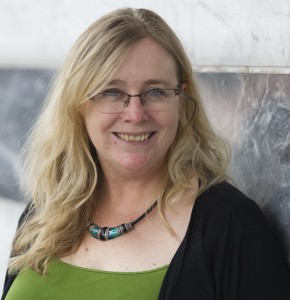This article by Library Services Manager Beth Matthias-Loghry was originally published in the Arizona Daily Star on September 27, 2015.
I was that undergraduate student who was content to be in class, but who lacked concrete direction and a sense of purpose. Sound familiar? Because I received financial aid, by the end of my sophomore year at Colorado College in Colorado Springs, I was able to escape serving food to students in the dining hall. Instead, I had a work study job in the Special Collections room of the library. The job helped pay my portion of the rent for the tiny little place that held an astonishing number of roommates and one black cat.
When I wasn’t seeking out any dance club where I could hear The Smiths and New Order—or commuting to Denver to go to the Wax Trax record shop and the Tattered Cover Bookstore—I worked in the library. Surrounded by glass-encased shelves chock full of materials, tattered books, facsimiles, and banks of filing cabinets, I definitely earned my paycheck. I sorted, matched, organized, and preserved items of all kinds, and provided pointers for people who wanted to dig into topics that could be as modest as shale or as interesting, historic, and magnificent as the Rockies.
Special Collections was the place where I got caught up in the wonder of learning. By getting my hands into history and touching the same books, pamphlets, postcards, papers, ledgers, and photos that others had touched decades and centuries before, I could make a connection to their lives. It’s unlikely that I will ever be able to see the real the Lindisfarne Gospels, beautiful manuscripts penned and decorated by monks in the 7th century. Because of my job, however, I got my hands on replicas of them. That tangible association to my subject drew me in. I learned more through looking at what people actually wrote or created up close rather than listening to somebody talk about it.
Although my mom was a die-hard librarian who was positive I should become a children’s librarian in a public library, it wasn’t until I worked in the Special Collections room that I realized what powerful places libraries and museums are. Museums and libraries collect records and arrange people’s experiences. They preserve artifacts and information in the original form and in an accessible way so we can learn from them and draw our own conclusions.
When I fulfilled my mother’s greatest expectation by becoming the children’s librarian at the Murphy-Wilmot Library, I began collaborating with the educational curators from museums and unique local attractions in our community. For the last 18 years, Pima County Public Library has partnered with Tohono Chul Park, Colossal Cave Mountain Park, the Arizona-Sonora Desert Museum, the Children’s Museum Tucson, and the Reid Park Zoo to offer summer adventures, educational programs, and hands-on learning opportunities for kids, teens, and adults.
Since I began overseeing the library’s Programs and Partners Office as a Library Services Manager and a member of our administration, my team and I have been making important connections with a focus on the community. Libraries and museums are spaces for self-directed learning, and it has been a privilege for me to tap into the creative skills and deep expertise of the educational community here. Working together gives both institutions the ability to provide more fun and engaging activities, programs, and exhibits that can encourage children to pursue their interests, and support them in making new discoveries.
And there is more to come. The Act One Culture Pass starts at the Joel D. Valdez Main Library on October 1. Pima County Public Library cardholders can check out free passes for arts performances, museums, and cultural destinations through the program. There is a natural synergy between libraries and museums, and the partnerships we maintain are critical to me as I work on strategic plans, projects, and grants, and help create programs that are free, accessible, educational, and fun for library customers of all ages.
I recently talked to one of my librarian colleagues about her plans to attend a training called, “Mind in the Making.” What’s that you ask? Well, hopefully I will get an even better picture when she gets back, but the training is focused on how museums and libraries can become, “brain-building power houses.” The information about the training reports: “…the power of museums and libraries is great, but the potential is even greater.”
Reaching for that potential sounds exciting to me.
My top three list from the Library’s Special Collections
I can’t take credit for these resources. Instead I stand in awe of librarians who gathered them together for the benefit of learners like me.
1. Reading Arizona: A Literary Map is a map of Arizona’s literary trail. “From the Grand Canyon to el Gran Desierto, across Route 66 and up the Devil’s Highway, over the San Francisco Peaks.”
2. Sonoran Heritage: A Learning Library Program includes displays and discovery guides focusing on the geographical and cultural history and markers of the area.
3. Perspectives of the Past is Pima County Public Library’s oral history project, which includes amazing interviews with local centenarians.
_____
Before working at Pima County Public Library as a part-time reference librarian and a children’s librarian, Beth Matthias-Loghry worked at the Lee Instructional Resource Center at TUSD and at Pinal County Public Library. As the number one fan of her sporty high school daughter, Beth follows the team bus to basketball and volleyball games around the state when she’s not visiting interesting places like Jerome, Arizona, and the Bird Cage Theater in Tombstone.


